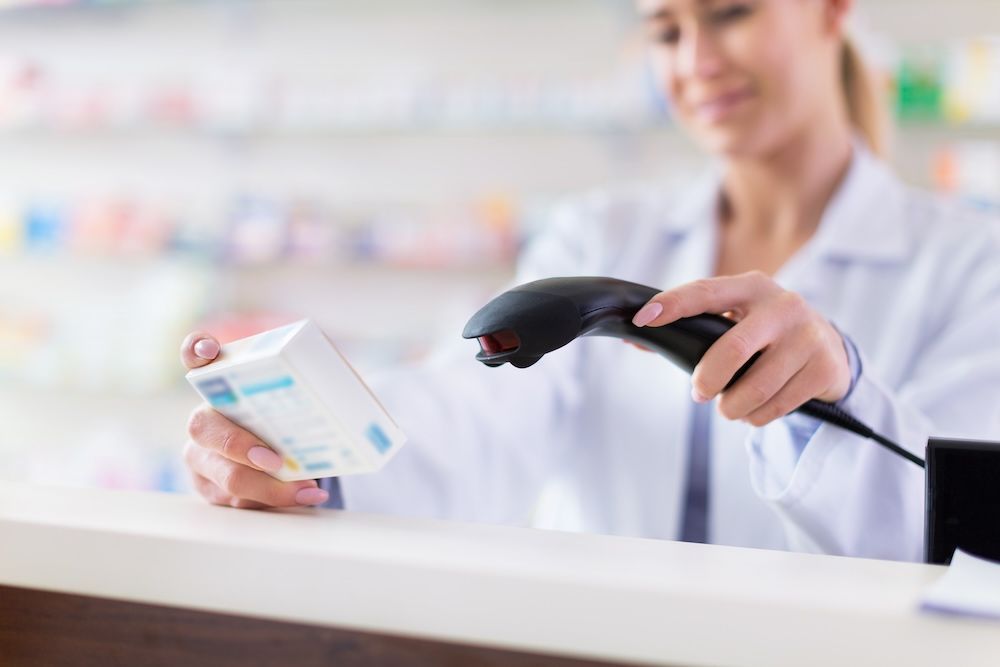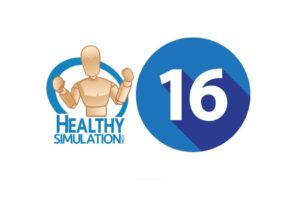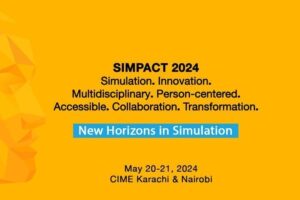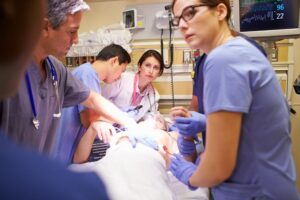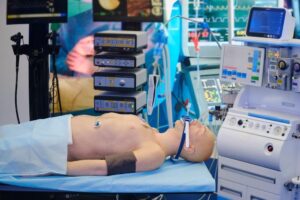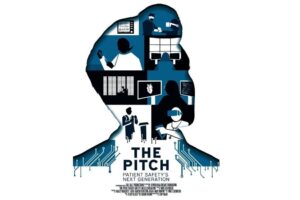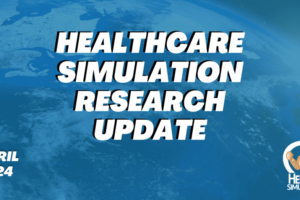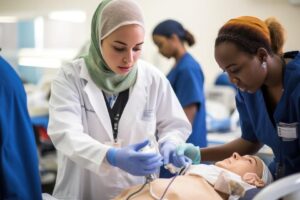Pharmacy Simulation
Healthcare Simulation has been incorporated into the Doctor of Pharmacy and their accreditation, The Accreditation Council for Pharmacy Education (ACPE). The ACPE is the national agency for the accreditation of professional degree programs in pharmacy and providers of continuing pharmacy education. The Accreditation Council for Pharmacy Education (ACPE) Accreditation Standards and Key Elements for the Professional Program in Pharmacy Leading to the Doctor of Pharmacy Degreehas established guidelines to guide professional education of the doctorally-prepared pharmacy programs. These standards describe areas where programs can experiment and innovate within the didactic and experiential components of their curricula to meet the required Educational Outcomes. Contemporary educational concepts are incorporated into the curriculum for competency-based student readiness to meet the need to be advanced pharmacy practice experiences (APPE-ready), provide direct patient care in a variety of healthcare settings (Practice-ready), and ability to contribute as a member of an interprofessional collaborative patient care team (Team ready).
See HealthySimulation.com’s CE webinars on Pharmacy Simulation:
- Integrating Pharmacy Learners Into IPE Healthcare Simulation Events
- Pharmacy Simulation Behind the Curtain: Operations and Safety Considerations
ACPE Accreditation Standards Specific to Simulation
Sponsored Content:
The following ACPE Standards specifically mention simulation:
- Standard 11: Interprofessional Education (IPE) – 11.2 Interprofessional team education which states that some but not all of the IPE activities may be simulations.
- Standard 12: Pre-Advanced Pharmacy Practice Experience Curriculum – 12.7 Simulation for Introductory Pharmacy Practice Experience (IPPE) states that a maximum of 60 clock hours of the total 300 hours may be completed in simulated practice experiences. However, the simulation hours do not substitute for the 150 clock hours of required IPPE time in the community and practice settings.
- Standards 18: Faculty and Staff – Quantitative Factors – 18.1 Sufficient faculty members are required to effectively address programmatic needs, including teaching via didactic, simulation, and experiential learning.
- Standard 21: Physical Facilities and Educational Resources – 21.2 Physical facilities’ attributes state the physical facilities are adequate to meet the program’s needs, including access to educational simulation capabilities.
Research to Support Simulation in Pharmacy Education
Simulation-based learning has been demonstrated as effective in application in clinical pharmacy. As clinical pharmacy evolves to include more patient-facing roles, educators need to embrace educational interventions and technologies that will support the acquisition and development of the skills of tomorrow’s workforce; SBT is one option that should be explored further.
Thibault et al. (2019), The Impact of Phone Interruptions on the Quality of Simulated Medication Order Validation Using Eye Tracking: A Pilot Study discusses the importance of order validation in pharmacy services, where pharmacists review orders with a focus on error prevention. Interruptions are frequent and may contribute to a reduction in error detection, thus potential medication errors. However, studying such errors in practice is difficult. Simulation has the potential to explore these events. In this pilot simulation study, there was a significant association between interruption and error detection (odds ratio = 0.149, 95% confidence interval = 0.042–0.525, P = 0.005). This association did not vary significantly between junior and senior student groups. This study demonstrates the importance of teaching pharmacy students about interruption eros and how to address these in clinical practice. The researchers observed an association between phone interruptions and a decrease in error detection during simulated validation. Simulation provides an opportunity to study order validation by pharmacists and may be a valuable teaching tool for pharmacists and pharmacy residents learning order validation.
Sponsored Content:
Beshir et al., (2022) Virtual patient simulation in pharmacy education: A systematic review
Abstractsummarises the impact of virtual patient simulation (VPS) on pharmacy students’ knowledge, skills, and perceptions. This review included 19 studies on VPS and concluded there were significantly improved higher-level learning, counseling, and decision-making skills more than paper-based cases. Learners’ confidence, student engagement, and satisfaction were positive. VPS enhances knowledge and clinical decision-making skills. This review stresses the need for pharmacy students to participate in active learning.
https://youtu.be/jj3tbfcMkwY&vq=hd1080
Yang et al. (2023) Pharmacy student’s perceptions, behaviours, and attitudes toward virtual reality simulation determined junior and senior pharmacy students positively perceived that VRS could help them with practical ability, autonomous learning, and theoretical knowledge. There was a significant positive correlation that was observed between mean perception score and mean attitude score, mean comparison, and mean behavior. This study revealed that pharmacy students who thought VRS was beneficial were more likely to embrace learning with VRS. This study provides some guidance for the need to establish interactive, immersive, and measurable VRS courses. When a good interaction between the faculty and students exists, technology improvement and blended programmatic assessment should be involved in challenges for implementing VRS courses.
Granier et al. (2023) Use of simulation for education in hospital pharmaceutical technologies: a systematic review: Data summary Our search criteria resulted in 6248 articles, of which 24 were assessed for eligibility, and 13 were included in the qualitative synthesis. Simulation in hospital pharmaceutical technology education is used in three different ways: first, as a playful pedagogical tool, with error-based simulations (cleanrooms and preparation sheets with errors), or game-based simulations (escape games, role-plays, and board games); second, as an electronic tool with virtual reality (virtual cleanrooms and serious games), or augmented reality (3D glasses); finally, to evaluate chemical contamination (fluorescein and quinine tests) and microbiological contamination (media-fill tests) during compounding to periodically requalify pharmacy technicians. Further studies, including non-technical skills evaluations, are needed to confirm the usefulness of this innovative technique in training as efficiently as possible actual and future pharmacy professionals.
Korayem et al. (2022) Simulation-Based Education Implementation in Pharmacy Curriculum: A Review of the Current Status: Simulation-based education (SBE) has become crucial for developing students’ teamwork, decision-making, and communication skills. The Accreditation Council for Pharmacy Education (ACPE) has acknowledged the benefit of SBE in interprofessional education (IPE) and the introductory pharmacy practice experience (IPPE). This article provides evidence that SBE can be effective beyond IPE and IPPE. This narrative review provides evidence that SBE is an effective teaching method that could be utilized within the pharmacy curriculum. This article stresses the importance of the educator to determine the best modality and placement of integrating patient simulation within the pharmacy curriculum. Combining multiple simulation techniques may be the best way to achieve the desired student learning outcomes.
Mourad et al. (2023) Ensuring Doctor of Pharmacy Graduates Have the Essential Competencies for Innovative Practice As the pharmacy profession continues to evolve from product-oriented to patient-centered, pharmacy programs have been transitioning from a traditional pharmacy curriculum to a competency-based education pedagogy. While these ideas have helped shape the new Accreditation Council for Pharmacy Education (ACPE) Standards and Center for the Advancement of Pharmacy Education (CAPE) Educational Outcome domains, recent publications have indicated that this is an integral for these Standards to include public health emergency preparedness and response. Updated Standards and Educational Outcomes must be integrated longitudinally into pharmacy curricula to ensure that graduates will be practice-ready healthcare professionals. This commentary highlights the strategic use of workforce development of population health based on two perspectives: emergency preparedness and response and digital health.
Pharmacy Simulation Resources
Pharmacy Simulator is a fully 3D simulated learning environment for pharmacists. Navigate a range of realistic patient encounters and learn from the detailed feedback. The Pharmacy Simulator is enjoyed by pharmacy students and professionals in the classroom and at home. Pharmacy Simulation engages learners in scenarios for all skill levels, from beginner to advanced. The scenarios allow for ease in editing and updating provided pharmacy scenarios, along with allowing the educator to write their own scenarios. The Pharmacy Simulator provides immediate feedback, tracks student progress, and is accessible on desktop or mobile devices.
King’s Health Partners (KHP) Pharmacy Foundation Simulation Pack began in 2021 with the King’s Health Partners and Lewisham and Greenwich NHS Trust. The project aimed to establish a model and infrastructure for using simulation as a method of training preregistration pharmacy professionals. This pharmacy foundation simulation pack contains nine simulation training scenarios for pharmacists in training and pharmacy technicians. Scenarios are designed to run for 10-20 minutes, with approximately 40 minutes to debrief the scenario. Each scenario includes: Each scenario has an overview with learning objectives and prep material, standardized patient/participant briefing, practitioner briefing and resources, and the debriefing. This pharmacy simulation resource states the importance for all simulation facilitators to receive training to facilitate and debrief the scenario.
Lumeto InvolveXR provides extended reality for IPE and Pharmacy experiences. InvolveXR aims to meaningfully reduce the huge social and financial cost of medical error. Flexible training in virtual simulated environments can improve the preparedness and confidence of clinicians globally. Lumeto operates across the healthcare spectrum, catering to educators and learners at every level of their competency, enhancing learning outcomes tied to individual and team decision-making, problem-solving, de-escalation, and complex or rare procedures.
SimPHARM by Education Management Solutions (EMS) is a clinical therapeutic simulation tool that creates a realistic clinical experience in which one minute of virtual time equals one minute of real-time. Ideal for flipped classroom learning environments, the platform’s cognitive game engine empowers students to develop their clinical decision-making skills at their own pace while under faculty supervision. With the EMS and the University of Otago partnership, a new standard for pharmacy education that effectively prepares students for real-world clinical practice was developed. SimPHARM helps students develop critical real-time decision-making skills and understand the consequences of those decisions through self-reflection, debriefing, and peer feedback.
Learn More About Simulation-Based Training Research: Application in Clinical Pharmacy!
Simulated Pharmacy Training Latest News
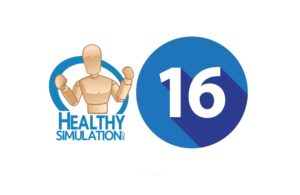
16 Must-Know Healthcare Simulation Key Terms
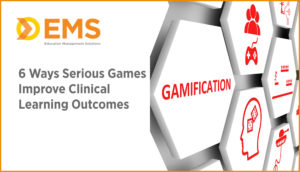
6 Ways Serious Games Improve Clinical Learning Outcomes
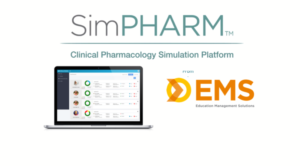
SimPHARM Launches Brave New World for Simulated Pharmacy Learning
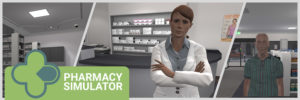
Pharmacy Simulator: New Serious Game with Infinite Scenario Opportunities — Exclusive Limited Time Discount!
Sponsored Content:



